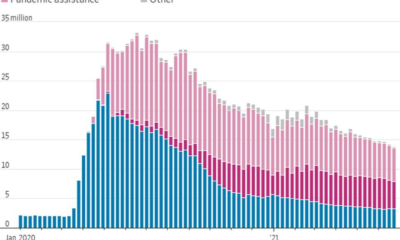Real Estate
Two Young Roommates Are Building An Artificial Intelligence Real Estate Empire – Forbes

Zuma Cofounders Shiv Gettu and Kendrick Bradley
For many years, people dreaded the emergence of artificial intelligence and new technologies. Those who grew up before the iPhone and internet felt that their jobs would be put into jeopardy.
The pandemic made even the most fervent Luddites change their attitude toward robotics, AI and technology. While sheltering at home, riding out the Covid-19 outbreak, they turned to online shopping on Amazon, ordering food deliveries via DoorDash and having others shop for food with the Instacart app. If a person needed to venture outside, and didn’t want to risk going on public transportation, they requested an Uber or Lyft car.
Now that we’ve become accustomed and dependent upon tech platforms for most of our activities, we don’t want to turn back. There is nearly an app for all aspects of our lives. Instant information and results are what we want.
Just as there is an Uber app, a driver is needed—at least until we have autonomous driverless cars. In many industries, AI will start the process and a person will be around to help. Car salespersons, real estate agents and clerks at department stores will supplement the initial interaction between AI and the customer.
If you think about it, most any sector can offer a better experience with the introduction of technology. Real estate is a great example of how AI, chatbots and tech can make the renting of an apartment a better experience. If you’ve rented before, you know how irritating it can be.
Two young entrepreneurs, Shiv Gettu and Kendrick Bradley, saw a need in the real estate rental market. Bradley left his engineering job to work at a property management company to learn the space, as a leasing agent. He noticed that there was a lack of technologies to support real estate sales teams. Roommates, Gettu and Bradley, while both working full-time jobs, set out to build a hospitality property company. It grew to $2 million in revenue in nine months.
However, when Covid-19 hit in 2020, Gettu and Bradley’s company had long-term lease commitments, and with business and leisure travel at a standstill, were running out of runway and needed to get their properties leased. The cofounders quickly turned the company into a virtual leasing office powered by AI to automate the conversion process, and that grew to become Zuma, launching today with a $6.7 million seed round in funding led by Andreessen Horowitz.
Their idea is to change the way apartments are rented. If you’ve ever shopped for a new apartment, you may have run into a hardened, tough-talking real estate agent. They schlep you around to apartments that are “amazing, beautiful and priced at a bargain price.” When you actually see the property, you think a mistake was made, since they’re not amazing, beautiful nor a bargain. After being shown five more apartments, you call it quits, as you’ve lost trust in the agent’s judgement and feel pushed into something you don’t want.
The next outing, you’re supposed to meet the building’s property manager, who can’t be found. An hour later, you spot him fixing something on the premises and gruffly orders you to follow him to see the apartment. His phone keeps ringing with tenants calling. You politely leave, and he doesn’t notice or seem to care.
The Zuma app
Consider how different this would be if the process was started online. You can send a text inquiring about an apartment listing. The AI will send a blueprint, the rental prices, amount of money required for deposit and the their terms of the lease. The texts can offer rich graphics, photos and videos highlighting the place. This could all be done from the comfort of your home. It’s less running around and a more productive use of time.
Automation also benefits the property owners. Consider a multifamily building with a property manager. If there is an interested renter who wants to make a quick decision, but it’s a night or weekend, this lead will go unanswered. The prospect will go elsewhere.
Zuma’s dynamic AI platform automates lead qualifications, engagement, follow-ups, demo and appointment scheduling. The platform, called Kelsey, is an “AI-powered sales assistant that answers complex questions in minutes, to qualify, nurture and convert leads to customers.”
“Kelsey understands which conversation tone, architecture and patterns are most successful at converting leads to sales, and converses with all inbound leads via text message within minutes to keep prospects engaged.” A human will step in to supplement Kelsey.
Connie Chan, general partner at lead investor Andreessen Horowitz, said, “Zuma’s blend between human support and AI creates a magical conversation experience for prospective customers that drastically increases conversion.”
The guys are working toward growing their business in the multifamily and related real estate sector. Ultimately, they plan to use their concept to apply to other industries. It’s amazing to see that the pandemic has created a boom in entrepreneurialism and shown how AI and tech, along with the human touch, can both improve the lives of people and build new innovative businesses.
Real Estate
Central banks end crisis-fighting measure as bank tumult recedes

Last month, the collapse of Silicon Valley Bank, the second-largest bank failure in US history, unleashed broader panic and raised fears the global financial system would seize up. Now, central banks are signaling that their immediate concerns have eased.
The Bank of England, the Bank of Japan, the European Central Bank and the Swiss National Bank said Tuesday that they would end daily measures to boost the flow of US dollars to lenders around the world. They cited “improvements in US dollar funding conditions” and “low demand” at recent operations aimed at providing liquidity.
Starting May 1, those operations will once again be held weekly, a decision made in consultation with the US Federal Reserve, the primary source of dollars. The frequency could increase again if needed, the four central banks said.
“These central banks stand ready to readjust the provision of US dollar liquidity as warranted by market conditions,” they said in their statements.
Policymakers sprung into action in March after the collapse of Silicon Valley Bank and Signature Bank in the United States sparked an acute bout of turmoil in the global banking sector. The tumult also nearly took down Credit Suisse (CS), a globally important but troubled bank, forcing Swiss authorities to arrange an emergency sale to rival UBS (UBS).
Hours after the Credit Suisse takeover was announced, the Fed said it would work with central banks in the United Kingdom, Japan, Canada, Switzerland and the European Union to make sure lenders there had access to the dollar liquidity they needed.
That meant making greater use of dollar swap lines, or agreements between the Fed and other central banks to provide dollars in exchange for, say, euros or yen.
Swap lines are a key instrument in central banks’ toolbox aimed at preserving financial stability and keeping credit flowing to households and businesses.
Real Estate
Fukushima’s fishing industry survived a nuclear disaster. 12 years on, it fears Tokyo’s next move may finish it off

It is still morning when Kinzaburo Shiga, 77, returns to Onahama port after catching a trawler full of fish off Japan’s eastern coast.
But the third-generation fisherman won’t head straight to market. First, he’ll test his catch for radiation.
It’s a ritual he’s repeated for more than a decade since a devastating earthquake and tsunami triggered a nuclear meltdown at the Fukushima Daiichi power plant in 2011, spewing deadly radioactive particles into the surrounding area.
Radiation from the damaged nuclear plant leaked into the sea, prompting authorities to suspend fishing operations off the coast of three prefectures that had previously provided Japan with half of its catch.
That ban lasted over a year, and even after it was lifted, Fukushima-based fishermen like Shiga were for years mostly limited to collecting samples for radioactivity tests on behalf of the state-owned electricity firm Tokyo Electric Power Company, or TEPCO, rather than taking their catches to market.
Ocean currents have since dispersed the contaminated water enough that radioactive cesium is nearly undetectable in fish from Fukushima prefecture. Japan lifted its last remaining restrictions on fish from the area in 2021, and most countries have eased import restrictions.
Shiga and others in the industry thought they’d put the nightmare of the past years behind them.
So when Japan followed through on plans to gradually release more than 1 million metric tons of filtered wastewater into the Pacific Ocean from the summer of 2023 – an action the government says is necessary to decommission the plant safely – the industry reeled.
The Japanese government and the International Atomic Energy Agency (IAEA), a United Nations body promoting the peaceful use of nuclear energy, say the controlled release, which is expected to take decades, will meet international safety regulations and not harm the environment, as the water will be treated to remove radioactive elements – with the exception of tritium – and diluted more than 100 times.
But with the deadline for the planned water release looming this summer, Fukushima’s fishermen fear that – whether the release is safe or not – the move will undermine consumer confidence in their catches and once again threaten the way of life they have fought so hard to recover.
Real Estate
Video shows US police at wrong house before shooting homeowner

Robert Dotson, 52, was killed by police on April 5 in New Mexico after officers responding to a domestic violence report arrived at the wrong house.
New Mexico police officers realised they were at the wrong address just moments before the front door opened and they fatally shot the armed homeowner, then exchanged gunfire with his wife, according to newly released body camera video of the April 5 shooting.
Robert Dotson, 52, was killed in Farmington, a city of 47,000 people in the southwestern US state, after officers on their way to a domestic violence call went to the wrong house.
The Farmington Police Department released several videos on Friday, including footage captured by body cameras worn by the three officers who fired their weapons.
“All of us – the men and women of the Farmington Police Department – recognise the severity of this incident,” Police Chief Steven Hebbe said in a statement.
“Once again, we wish to express our condolences to the Dotson family, and as your chief of police, I wish to convey how very sorry I am that this tragedy occurred,” Hebbe said.
-

 Business3 years ago
Business3 years agoHyundai Leads Industry in U.S. News & World Report 2023 Best Cars for the Money Awards
-

 Innovation3 years ago
Innovation3 years agoJay-S ventures into the urban genre with “Bailar en la Playa” his latest production
-

 Business3 years ago
Business3 years agoThree Questions Small Business Owners Should Ask In Creating A Workplace Culture – Forbes
-

 Business3 years ago
Business3 years agoA Fintech Makes It Easy For Small Businesses To Offer 401(k) Retirement Benefits – Forbes
-

 Business3 years ago
Business3 years agoBritain’s Small Businesses See Better Times Ahead But Is Their Optimism Justified? – Forbes
-

 Money3 years ago
Money3 years agoCharlie Crist leads Democratic gubernatorial field again in money chase – Florida Politics
-

 Money3 years ago
Money3 years agoTesting New Tools for Horizon Worlds Creators To Earn Money
-

 Business3 years ago
Business3 years agoSmall Business Labor Shortage – Forbes
